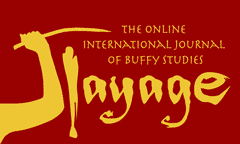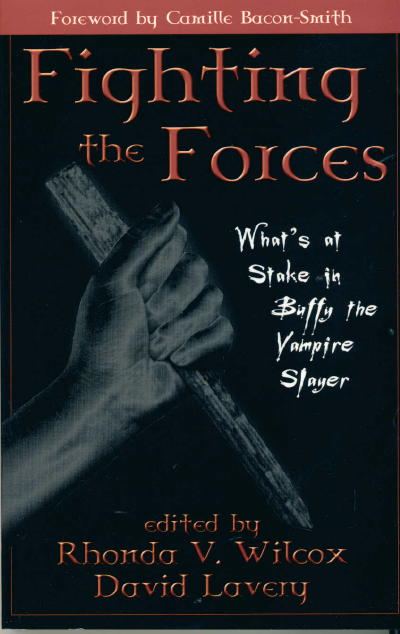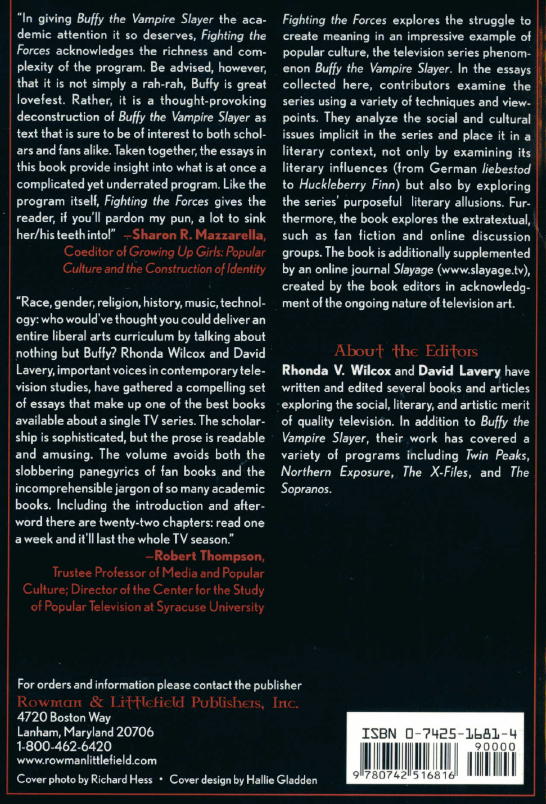

 Fighting the Forces: What's at Stake in Buffy the Vampire
Slayer
Fighting the Forces: What's at Stake in Buffy the Vampire
Slayer
Fighting the Forces has gone into its 2nd printing.
Edited by Rhonda V. Wilcox & David Lavery, with a foreword by Camille Bacon-SmithFor a review of FFWSBtVS in Extrapolation, go here (Acrobat Reader required).
For a review of FFWSBtVS in The New York Observer go here.
For an article on FFWSBtVS on CreativeLoafing (Atlanta), go here.
For a review of FFWSBtVS on the website of CESNUR (Center for Studies on New Religion), go here.
Table of Contents | ||
|---|---|---|
| Introduction | by Rhonda V. Wilcox and David Lavery | |
Part I. Forces of Society and Culture: | ||
| Chapter 1. | “Who Died and Made Her the Boss?” Patterns of Mortality in Buffy the Vampire Slayer | by Rhonda Wilcox |
| Chapter 2. | "My Emotions Give me Power": The Containment of Girls' Anger on Buffy the Vampire Slayer | by Elyce Helford |
| Chapter 3. | "I'm Buffy and You're . . . History”: The Postmodern Politics of Buffy the Vampire Slayer | by Patricia Pender |
| Chapter 4. | Surpassing the Love of Vampires: Or Why (and How) We are Denied a Queer Reading of Buffy/Willow | by Farah Mendlesohn |
| Chapter 5. | Choosing Your Own Mother: Witchcraft and Female Power in Buffy the Vampire Slayer | by J. P. Williams |
| Chapter 6. | Staking in Tongues: Speech-Act as Weapon in Buffy the Vampire Slayer | by Karen Eileen Overbey and Lahney Preston-Matto |
| Chapter 7. | Slaying in Black and White: Kendra as Tragic Mulatto in Buffy the Vampire Slayer | by Lynne Edwards |
| Chapter 8. | The Un-Demonization of Supporting Characters in Buffy the Vampire Slayer | by Mary Alice Money |
| Chapter 9. | Imported Mythologies: American Christianity and Buffy the Vampire Slayer | by Greg Erickson |
| Chapter 10. | Darkness Falls on the Endless Summer: Buffy as Gidget for the Fin de Siecle | by Catherine Siemann |
Part II: Forces of Art and Imagination (Past): | ||
| Chapter 11. | Of Creatures and Creators: Buffy Does Frankenstein | by Anita Rose |
| Chapter 12. | Sex and the Single Vampire: The Evolution of the Vampire Lothario and Buffy the Vampire Slayer | by Diane DeKelb-Rittenhouse |
| Chapter 13. | Digging the Undead: Death and Desire in Buffy the Vampire Slayer | by Elizabeth Krimmer and Shilpa Raval |
| Chapter 14. | Spirit Guides and Shadow Selves: From the Dream Life of Buffy (and Faith) | by Donald Keller |
| Chapter 15. | Hubble-Bubble, Herbs and Grimoires: Practical Magic and Witchcraft in Buffy the Vampire Slayer | by Tanya Krzywinska |
| Chapter 16. | Whose Side Are You On, Anyway? Children, Adults, and the Use of Fairy Tales in Buffy the Vampire Slayer | by Sarah E. Skwire |
Part III. Forces of Arts and Imagination (Present): | ||
| Chapter 17. | Crossing the Final Taboo: Family, Sexuality, and Incest in the Buffyverse | by Kristina Busse |
| Chapter 18. | “This is Oz. He’s in a Band”: Buffy the Vampire Slayer and the Rhetoric of Music | by S. Renee Dechert |
| Chapter 19. | Buffy’s Mary Sue is Jonathan: Buffy the Vampire Slayer Acknowledges the Fans | by Justine Larbalestier |
| Chapter 20. | WWW.Buffy.Com : Cliques, Boundaries, and Hierarchies in an Internet Community | by Amanda Zweerink and Sarah N. Gatson |
End Materials | ||
| Afterword | The Genius of Joss Wheden | by David Lavery |
| Episode Guide | ||
| Bibliography | ||
| Index | ||
Contributors | ||
|
Camille Bacon Smith is a folklorist and novelist, author of Enterprising Women, Science Fiction Culture, and novels such as The Face of Time and Eye of the Daemon. |
Kristina Busse is a doctoral candidate at Tulane University. She teaches at the University of South Alabama. | S. Renee Dechert is an assistant professor of English at Northwest College in Wyoming. |
|
Diane DeKelb-Rittenhouse is a published author of short horror fiction, including the vampire story "To Die For" in Night Bites: Vampire Stories by Women (edited by Victoria A. Brownworth, Seal Press, 1996). |
Lynne Edwards received her Ph.D. at the University of Pennsylvania. She teaches at Ursinus College. |
Greg Erickson teaches English at Medgar Evers College and music at the Brooklyn Conservatory of Music. He has degrees in both English and music and is currently a Ph.D. candidate in English at the Graduate Center in New York City. |
|
Sarah N. Gatson is an Assistant Professor of Sociology at Texas A&M University, and earned her Ph.D. at Northwestern University. Interested in the subfields of Inequality, Race, Ethnicity, Law, Gender, Culture, and qualitative methods, she is the author of “Labor Policy and the Social Meaning of Parenthood” (1997, Law and Social Inquiry), and is co-author with Amanda Zweerink, “Choosing Community: Rejecting Anonymity in Cyberspace” (Research in Community Sociology, Volume X, August 2000). She is currently working with Ms. Zweerink on a book-length ethnography of the community spawned from the www.buffy.com Posting Board (the auspices through which she and Ms. Zweerink met), as well as on projects dealing with the multiracial identity movement, race and citizenship in US legal culture, and historical and contemporary feminist theory. |
Elyce Rae Helford is Associate Professor of English and Director of Women’s Studies at Middle Tennessee State University. She is the co-editor of Enterprise Zones: Critical Positions on Star Trek (Westview Press, 1996) and editor of Fantasy Girls: Gender in the New Universe of Science Fiction and Fantasy Television (Rowman and Littlefield, 2000). | Donald Keller has been writing criticism and publishing fanzines about science fiction and fantasy for the last quarter-century. He has been publisher and editor of the small press Serconia Press, putting out critical works by Brian Aldiss, Samuel R. Delany, and John Clute over the last decade. He was Managing Editor and frequent contributor to The New York Review of Science Fiction 1990-1995. He co-edited (with Ellen Kushner and Delia Sherman) The Horns of Elfland (Roc 1997), an anthology of fantasy stories about music. He contributed a number of entries to The Encyclopedia of Fantasy (1997). His e-mail list the still point discusses contemporary music and Buffy the Vampire Slayer. He is a proofreader by profession. |
|
Elizabeth Krimmer is Assistant Professor of German Literature at Mount Holyoke College. She received her Ph.D. at the University of Massachusetts at Amherst with a dissertation on women's cross-dressing in the 17th and 18th century. Most of her recent publications deal with 18th century women's literature. |
Tanya Krzywinska is a professor of film studies at Brunel University in London. She is the author of A Skin For Dancing In: Possession, Witchcraft and Voodoo in Film (Flicks Books, 2000) and co-editor (with Geoff King) of Science Fiction Cinema: From Outerspace to Cyberspace (Wallflower Press, 2000), and ScreenPlay: Cinema / Videogames / Interfaces (forthcoming from Wallflower Press, 2001). | David Lavery is Professor of English at Middle Tennessee State University. The author of over forty essays in journals ranging from Parabola to Georgia Review, he is the author / editor-co-editor of Late for the Sky: The Mentality of the Space Age (Southern Illinois University Press, 1992 ), Full of Secrets: Critical Approaches to Twin Peaks (Wayne State University Press, 1994), "Deny All Knowledge": Reading The X-Files (Syracuse University Press, 1996), Twin Peaks in the Rearview Mirror: Appraisals and Reappraisals of the Show that Was Supposed to Change TV (forthcoming). He is currently assembling a collection of essays on The Sopranos. |
|
Justine Larbalestier is a Research Fellow at the University of Sydney. Her book on the battle of the sexes in science fiction film is forthcoming from Wesleyan University Press. She is currently writing a book about the history of science fiction in New York City, 1938 -1960. |
Farah Mendelsohn is features editor for the British science fiction journal Foundation. | Mary Alice Money is Professor of English at Gordon College. |
|
Karen Eileen Overbey is a doctoral candidate at New York University. |
Patricia Pender is a doctoral student in the English Department at Stanford University. She is writing a dissertation on early modern women's writing and contemporary feminist theory. Her article, "Disciplining the Imperial Mother: Anne Bradstreet's A Dialogue Between Old England and New" is forthcoming in Women Writing 1550-1750, a special edition of Meridian. | Lahney Preston-Matto is a Ph.D. candidate at NYU. She currently teaches at Montclair State University in New Jersey. |
|
Shilpa Raval is Assistant Professor of Classical Studies at Yale University. She received her Ph.D. from Brown University and has published articles on the intersection of gender, language, and sexuality in Latin epic. She is currently working on an article on cross-dressing and gender identity and a monograph on the representation of rape in various texts from 1st century Rome. |
Anita Rose received her Ph.D. at the University of North Carolina, Greensboro, where her dissertation was on nineteenth century socialist utopias. She teaches English at Converse College in South Carolina. | Sarah E. Skwire received her Ph.D. in English from the University of Chicago. She has published a composition textbook, an article on chronically-ill seventeenth century poets, a variety of book reviews, several poems, and an on-line humor column. |
|
Catherine Siemann is a doctoral candidate at Columbia University. |
Rhonda Wilcox is Professor of English at Gordon College in Barnesville, GA. The author of numerous essays on popular culture, including "'There Will Never Be a Very Special Buffy: Buffy and the monsters of Teen Life" in The Journal of Popular Film and Television [1999]), she wrote the chapter on television for the forthcoming Handbook of American Popular Culture (Third Edition), and, with J. P. Williams, is the author of Unreal TV (forthcoming). The past-president of the Popular Culture Association in the South, she is a member of the editorial boards of Studies in Popular Culture and Intensities: The Journal of Cult Media. |
J. P. Williams teaches at North Carolina State University. With Rhonda Wilcox, she is the author of Unreal TV (forthcoming). |
| Amanda Zweerink is a professional in the advertising industry, holding a B.A. in English literature. Studying the Bronze, to her, has always been about telling a story. With a journalism and public relations background, she is most interested in finding ways to portray the reality of the board to those who aren’t involved with it. | ||
